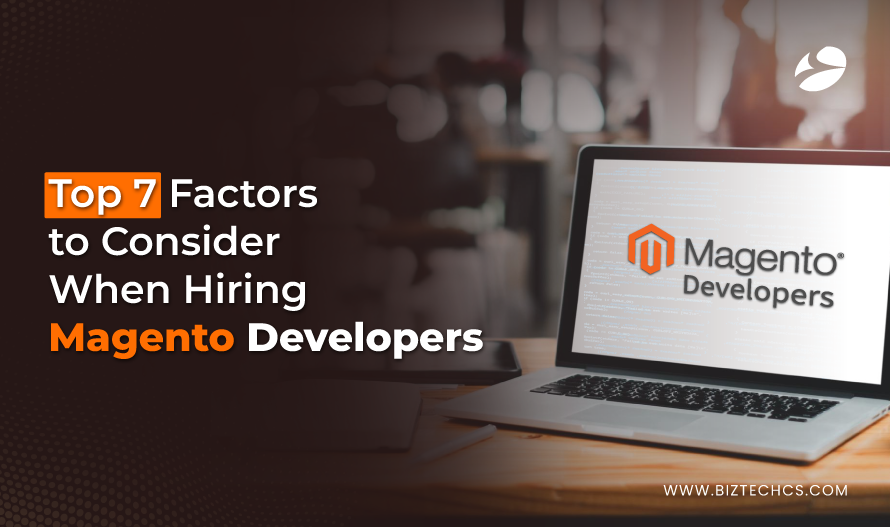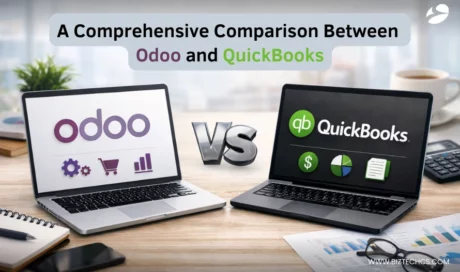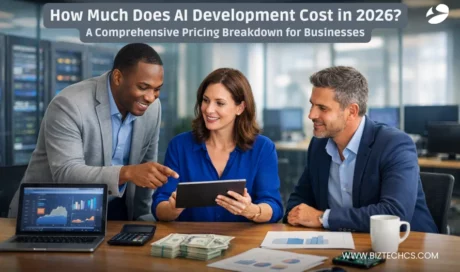1633
Top 7 Factors to Consider When Hiring Magento Developers
5 min read
1633
5 min read

Creating an effective online business on Magento goes beyond the brilliant concept—having a well-versed developer on the platform is equally important.
Magento’s flexibility and scalability have great potential, making it suitable only for those who know how to use it. It is crucial to locate an expert programmer who is well-equipped to comprehend your idea as a business owner and has the skills to help implement the vision. When you hire Magento developer, make sure they are well-versed in the latest updates and features of the platform.
Their familiarity with the latest versions of Magento and their approach to optimizing your site for performance can make or mar your website’s speed and dynamics.
In this blog, we will discuss the seven critical aspects to focus on while selecting Magento developers. Considering these factors, you can hire the most qualified professional for the task.
Your choice of a developer can make a big difference between an average e-commerce website and a unique one.
1. Proficiency in Magento Frameworks (Magento 2.x, PWA Studio, etc.)
When looking for a Magento developer, the person hired must be conversant with the particular Magento version. It is crucial to select a developer proficient in Magento 1.x or Magento 2.x since both frameworks are totally different.
For example, there is a difference between 2.x versions of Magento – they have better performance and built-in framework.
It is crucial to have experience with Magento PWA Studio for the development of a PWA. Find out whether the developer knows these features and tools common to your given Magenti version for the next project.
2. Experience with Magento-Specific Modules and Extensions
A good Magento developer should have experience integrating Magento-specific modules and extensions. These modules are fundamental for the functioning of any eCommerce site, including the management of products and orders and, most importantly, to purchase.
Application with a developer who would be well acquainted with how the third-party services such as Payment gateways or Shipping services will be useful. They should also be capable of developing unique extensions that will suit your particular needs.
Such information will be useful in determining whether the Magento platform is a better fit for your business’s needs.
3. Understanding of Performance Optimization Techniques
One of the crucial considerations one needs to make while hiring a Magento developer is performance optimization since the sites will be busy. Therefore, Magento stores can become slow, which is not good for user experience and, subsequently, sales.
The developer should know caching, indexing, and many other server optimization methods for a fast-loading site. Third-party programs like Varnish, Redis, and other programs dedicated specifically to Magento’s optimization are essential for increasing speed.
Ensure that you work with a developer who can handle the performance issues that arise when using complex catalogs or large product inventories.
4. Ability to Build Custom Themes and Integrate Responsive Designs
Custom themes and the integration of responsive design are compulsory for the website’s proper functioning. Although standard themes are available with Magento, a developer should be able to custom-design your site to meet your brand identity.
They should know about adaptable web design, which means the site should be usable on both computers and smartphones.
A good Magento developer should be familiar with front-end technologies like LESS, CSS, and JavaScript frameworks. It will also be used to build a professional and friendly online store.
5. Security Knowledge for Magento Development
Security is a big issue for any eCommerce site, and your Magento developer needs to address it. For whatever reason, Magento stores are often attacked for security flaws, and one must specifically hire someone who knows how to prevent this.
The developer should understand threats like SQL injection, cross-site scripting (XSS), and cross-site request forgery (CSRF). They should also know how to install SSL certificates and apply a security patch.
Maintaining your Magento store security helps provide buyers a safe shopping experience.
6. Ability to Handle Scalability and High-Traffic Scenarios
When running a business, one of the main problems is scalability, especially as the business reaches the stage of dynamic development. Your Magento developer should work with you to create a scalable solution for a growing number of visits and many products.
This also means fine-tuning databases and cloud hosting should traffic patterns indicate that visitors will increase. If deemed appropriate, the developer should also know multi-store or multi-language environments if required.
There are things which, when done properly will help in scaling of magnesium store to be efficient as the business grows.
7. Experience with Version Control and Collaboration Tools
Lastly, a good Magento developer should be proficient in version control and collaboration. There are tools such as Git that can aid in tracking the changes made to the code, making work easier especially when working in a team with other developers.
Knowledge of project management and deployment solutions such as Jenkins, Jira, and Docker enables effective and seamless integration. It is crucial to have a high-quality codebase and ensure that the project does not diverge in unnecessary directions.
If used properly, these tools will enhance productivity, and if a developer has skills in applying them, the overall development process will become more organized.
1. Understand Your Requirements
To choose a Magento developer, it is important to determine your goals clearly in advance. Decide if you require a front-end, back-end, or full-developer, as well as whether the work involves creating a new site, redesigning, or improving an existing site.
Also, do not forget to indicate in your site list whether your site is based on Magento 1.x or Magento 2.x because there is a set of essential distinctions between the two.
2. Look for Experience
Look for a Magento developer with proven experience, ideally through certification, as it demonstrates their proficiency with the platform. Request to see their portfolio and check if they’ve worked on similar eCommerce projects, especially Magento sites.
Experience in your specific industry can be beneficial, as it means the developer may already understand your business needs and challenges.
3. Technical Skills
Ensure the developer is proficient in the main web technologies, including PHP, MySQL, HTML, CSS, JavaScript, and Magento. They should have experience with Magento Hyva theme development and be capable of editing theme plugins and developing custom modules tailored to your business needs.
It is also desirable that they have experience working with third-party systems such as payment gateways, CRMs, or ERPs to ensure proper operation.
4. Check for Problem-Solving Skills
Debugging skills or the ability to analyze and solve problems is also important because, as mentioned before, Magento is intricate. Test the candidate’s experience by asking them about previous challenges the developer had to overcome.
Additionally, the developer should know how to optimize your site for performance, especially if you are selling on a large eCommerce store.
5. Familiarity with Security Practices
It is essential to ensure that your developer understands good practices for protecting your store because Magento is popular with hackers. They should be able to quickly install security patches and ensure your store has the latest version of Magento.
This means your site is protected against various risks and meets all the security requirements.
6. Communication and Collaboration
Effective communication with the developer is essential; therefore, the latter should be able to explain the details of the project in simple terms. If the project is large, it is wise to have a well-versed developer who can use project management tools such as JIRA or Trello to manage tasks and timelines.
Periodic meetings and communication will keep you on the same page throughout the entire process.
7. Test Their Skills
If you want to assess the developer’s aptitude for solving problems and the quality of their performance, you can assign them a small task. You could present them with a problem, for instance, fixing a bug or even adding a feature, and observe how they solve it.
While conducting the interview, it is important to determine the depth of their technical knowledge and their capacity to use simple and understandable language to describe the ways and methods used to arrive at specific solutions.
8. Budget and Cost
Decide which model is suitable for you, an hourly rate or a fixed price per project, depending on the task. However, it should not be done at the lowest possible price because this means that quality is also low. Both expertise and cost will be key in guiding you to get the most value out of your investment.
1. Magento-Specific Expertise
Magento developers should understand Magneto’s basic structure, which follows the MVC pattern. They should also be able to work with modules, including creating, configuring, and extending both frontend and backend modules.
Magento has a theme structure; therefore, understanding this structure and having basic and/or advanced knowledge of PHP, XML, and CSS is vital when modifying or developing new themes.
Due to performance, security, and architecture updates between Magento 2.x and Magento 1.x, developers should be comfortable with Magento 2.x.
2. Frontend Technologies
HTML5 and CSS3 are especially important for Magento developers to understand, likewise, for the custom themes and for the responsive design. They should also know JavaScript and jQuery, as this framework is integrated into Magento by default.
It is useful if the participants know contemporary frontend frameworks such as React or Vue, or even Angular for more complicated, complex and updated interfaces.
Furthermore, it is also significant to know how the system of templates—PHTML files—works and how it is arranged for a smooth and well-organized theme.
3. Backend Technologies
A Magento developer should know PHP, especially OOP, as PHP is the core of the Magento platform. They must also be familiar with MySQL or MariaDB and able to perform query optimization and design good data models.
Knowledge of third-party extension installation using Magento REST and SOAP APIs, as well as shell commands through the Command Line Interface (CLI), is necessary.
It is also essential to understand the concept of cron jobs for the automation process, indexing, and other repetitive tasks.
4. Security
Magento developers should be aware of general security threats like SQL injection and cross-site scripting attacks and follow Magento’s general security guidelines.
This principle is crucial for communication and data security since it relies on a client’s understanding of SSL certificates and encryption techniques.
Another essential regulation that developers should know in advance is PCI-DSS, which is especially relevant for payment processing in eCommerce stores.
Such expertise reduces risks and safeguards the customer data to make the online shopping experience trustworthy.
5. Version Control and Collaboration Tools
Git is used for managing version control, and Magento developers should know this tool well. They should be able to perform version control in the code and rely on other developers.
Understanding various Continuous Integration/Continuous Deployment (CI/CD) processes helps avoid deployment problems, integrate the tests, and monitor the stages continuously.
They help the developers develop teamwork skills and ensure high-quality code throughout the developmental phase.
6. Testing
Magento developers should understand unit testing, preferably in PHP with PHPUnit tools, to check that every component works properly. They should also be able to run Functional testing that confirms the overall functionality of the Magento storefront and back-end work.
Experience in test automation is decisive, in particular, because it allows for the quicker and more effective execution of testing phases.
Automating testing into the development approach is preferred since it enhances the quality of the code and the number of bugs.
7. DevOps and Deployment
It would be beneficial for any developers to have at least a rudimentary knowledge of servers particularly Linux servers, as these are most frequently used for Magento development.
They should also be familiar with web servers such as Apache and Nginx and the settings required to run the Magento application.
Understanding the deployment pipelines is crucial, especially when deploying to cloud platforms like AWS, Digitalocean, Magento Commerce Cloud, etc.
Basic knowledge of tools such as Docker is always useful, as it enables developers to create similar development and production environments.
Here are some interview questions to help you evaluate Magento developers:
These questions focus on a balance of technical skills, problem-solving, and the ability to stay current in the rapidly changing Magento ecosystem.
In conclusion, hiring the right Magento developer was discussed, and it was stated that a few key points should be considered before hiring this specialist.
First, evaluate their skill and working experience regarding the platform, as master skills are essential to the project’s success.
Apart from technical know-how, other essential attributes include effective communication and desirable knowledge of the business objectives. Do not forget to know their portfolio to be certain that they have managed different tasks similar to your own.
Again, their stratification of testing, debugging, and post-launch support should emulate your quality expectations. Lastly, examine their adaptability and the solutions they offer to your business’s expansion over time.
If you are searching for Magento developers, we offer you experienced experts who can make your idea a reality. All our developers focus on building fast and optimized Magento stores that meet your requirements.

Artificial Intelligence (AI)
85
By Nandeep Barochiya

Odoo
184
By Uttam Jain

Artificial Intelligence (AI)
379
By Nandeep Barochiya